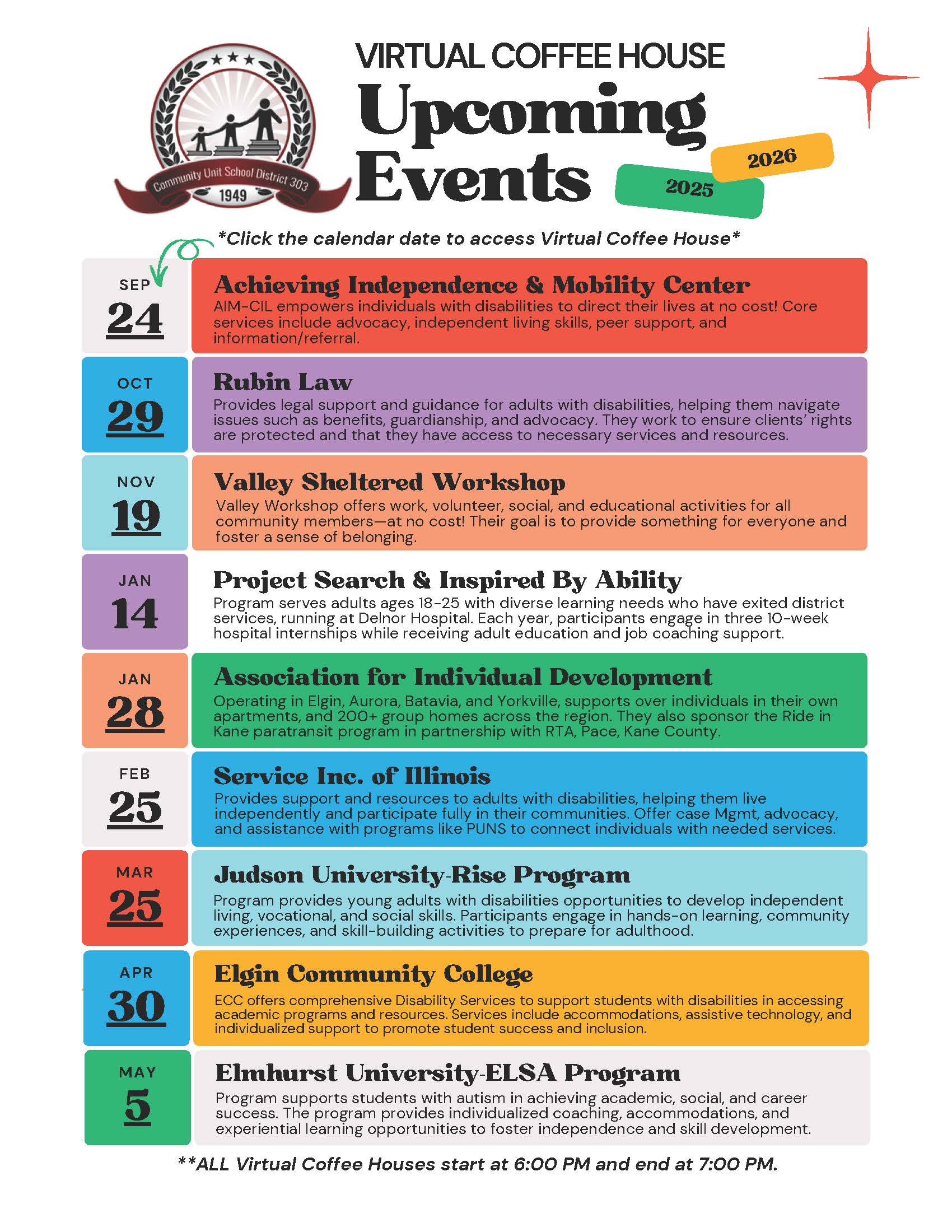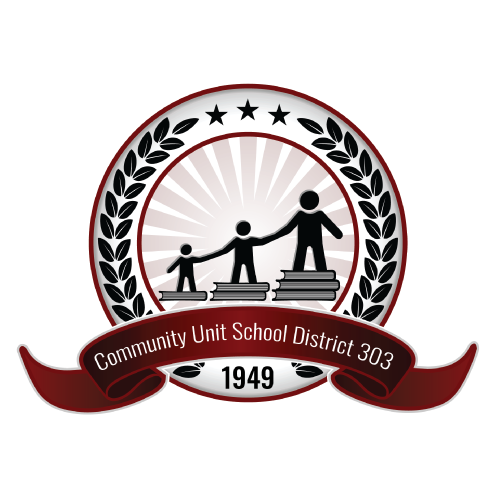In District 303, we are committed to creating pathways to excellence while honoring the dignity and individuality of every student. Guided by our core values of belonging, perseverance, and achievement, we work to meet students' unique needs throughout their learning journey.
Our Special Education department supports students with disabilities by collaborating with school teams, families, and community partners. Together, we ensure students have access to the core curriculum, opportunities for advanced learning, and individualized instruction that promotes academic growth.
St. Charles School District 303 offers a full continuum of services for students who qualify under the Individuals with Disabilities Education Act (IDEA) or Section 504 of the Rehabilitation Act, ensuring educational equity and meaningful support for all learners.
“The Parent Guide” Educational Rights and Responsibilities: Understanding Special Education in Illinois
Required Notifications
On August 23, 2019, Governor Pritzker signed into law HB 3586. This legislation ensures that a copy of your child’s related service log is provided to you at the Annual Review meeting or upon your request. Related service(s) may include: Social Work, Speech Language Therapy, Occupational Therapy, Physical Therapy, Orientation and Mobility and/or Health services as outlined in your student’s Individual Education Plan. The logs reflect services delivered within the school setting and will include the date, type of service (direct or consultative), and the amount of time the specific service was provided.
About SEPAC/Sobre SEPAC
The District 303 Special Education Parent Advisory Council is a district-wide collaboration of parents, staff, administrators, and community members. SEPAC will promote understanding of and respect for the inclusion of children with disabilities. Meetings are open to parents of students in Special Education and to anyone who would like to attend.
El Consejo Asesor de Padres de Educación Especial del Distrito 303 es una colaboración entre los padres, el personal, los administradores y los miembros de la comunidad de todo el distrito. El SEPAC promueve la comprensión y el respeto por la inclusión de los niños con discapacidades. Las reuniones están abiertas a los padres de estudiantes de Educación Especial y a padres que deseen asistir.
Upcoming SEPAC Meetings/Próximas Reuniones del SEPAC
- Nov. 5 > 5:30 pm - 6:30 pm
- Feb. 11 > 5:30 pm - 6:30 pm
- May 6 > 5:30 pm - 6:30 pm
All meetings will be held at Lincoln School - 211 South 6th Ave. St. Charles, IL 60174
Details of the meeting will be updated as the date gets closer.
- Nov. 5 > 5:30 pm - 6:30 pm
- Feb. 11 > 5:30 pm - 6:30 pm
- Mayo 6 > 5:30 pm - 6:30 pm
Todas las reuniones se llevarán a cabo en la Escuela Lincoln - 211 South 6th Ave. St. Charles, IL 60174
Los detalles de la reunión se actualizarán a medida que se acerque la fecha.
View 2025 SEPAC Meeting Presentations
Illinois PUNS-Division of Developmental Disabilities
PUNS is a statewide database that records information about individuals with developmental disabilities who are planning for or seeking services. The state uses the data to select individuals for services as funding becomes available, to develop proposals and materials for budgeting, and to plan for future needs.
The Understanding PUNS Guide is included with the procedural safeguards and linked below in the special education resources section.
If you have questions regarding PUNS enrollment or the database, please contact the appropriate Director within Student Services based on your student's grade level:
- Early Childhood: Jennifer Mursu (331-228-2584)
- Elementary: Chris Rzemieniecki (331-228-5939) or Karen Pratt (331-228-5044)
- Middle School: Jennifer Phillips (331-228-5908)
- High School/Transition: Aubree Schuett (331-228-5635)
Special Education Documents
-
Parent Guide - Special Education, IL
-
IDHS Understanding PUNS Guide
-
Entender la PUNS (PUNS Guide)
-
Common Acronyms
-
Notice of Procedural Safeguards
-
Aviso de Salvaguardias Procesales (diciembre 2021)
-
Procedural Safeguards_ Polish
-
Procedural Safeguards_ Ukrainan
-
Procedural Safeguards_ Gujarati
-
IL ABLE Brochure Public Education
-
IL ABLE Brochure Public Education (SP)
Special Education Learning & Networking Collective
The purpose is to create a supportive community where participants can access reliable information and connect parents and caregivers of students with disabilities through shared learning experiences, peer support, and meaningful community connections.
Virtual Coffee House | Upcoming Events (2025-2026)
- September 24 - Achieving Independence & Mobility Center
- October 29 - Rubin Law
- November 19 - Valley Sheltered Workshop
- January 14 - Project Search & Inspired by Ability
- January 28 - Association for Individual Development
- February 25 - Service Inc. of Illinois
- March 25 - Judson University-Rise Program
- April 30 - Elgin Community College
- May 5 - Elmhurst University-ELSA Program
**All Virtual Coffee Houses start at 6:00pm and end at 7:00pm
Click here to view more details & join the Virtual Coffee House


